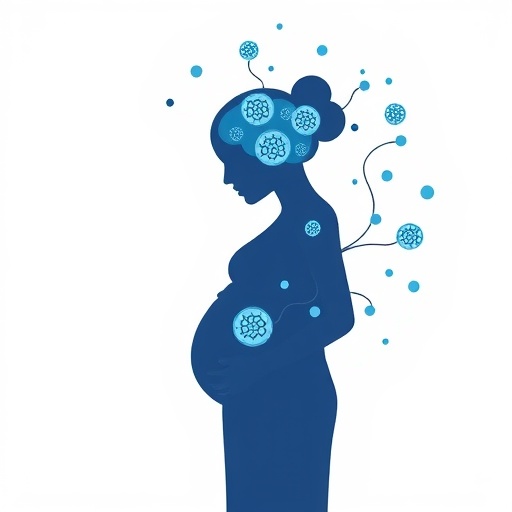A groundbreaking study published in BMC Psychiatry this year sheds new light on the intricate interplay between depression and anxiety symptoms in pregnant women, using sophisticated network analysis methods to uncover not only the core symptoms but also their associations with cognitive fusion, a lesser-known yet pivotal psychological concept. This research, conducted in two major obstetric outpatient clinics in Guangdong Province, China, offers fresh insights into the perinatal mental health landscape, carrying substantial implications for clinical practice and future therapeutic interventions.
Pregnancy is widely acknowledged as a period of profound emotional and physiological change, often accompanied by heightened vulnerability to mental health disorders such as depression and anxiety. These conditions can co-occur, exacerbating risks for both the mother and the developing fetus. Despite substantial epidemiological data documenting their prevalence, the nuanced symptom-level dynamics between depression, anxiety, and cognitive processes like cognitive fusion have remained obscure—until now.
The investigators enrolled 1691 pregnant women between June 2021 and August 2023, meticulously assessing depressive symptoms using the Edinburgh Postpartum Depression Scale (EPDS), anxiety symptoms via the Generalized Anxiety Disorder Scale (GAD-7), and cognitive fusion through the Cognitive Fusion Questionnaire-Fusion (CFQ-F). This comprehensive data collection enabled a finely grained network analysis, a method that transcends traditional statistical approaches by modeling symptoms as interacting nodes within a complex system rather than independent entities.
Network analysis conceptualizes mental health symptoms as interconnected elements that influence each other dynamically. This methodological innovation allowed researchers to identify ‘central symptoms’—those exerting the greatest influence within the depression-anxiety nexus—and ‘bridge symptoms’ that act as conduits linking the two affective disorders. Importantly, the study also explored how cognitive fusion, a cognitive process involving excessive attachment or entanglement with thoughts, integrates into this symptomatic network.
Findings revealed a disconcertingly high prevalence of depression and anxiety among the participants: 43% met criteria for depression (EPDS ≥ 9), 31.7% for anxiety (GAD-7 ≥ 7), with a striking 25% experiencing comorbid conditions. This prevalence underscores an urgent need for targeted mental health strategies within prenatal care frameworks. Central symptoms identified within the integrated network included feelings of being "sad or miserable," difficulty "troubling relaxing," and episodes of feeling "scared or panicked," illuminating focal points for clinical attention.
Moreover, the analysis uncovered that specific symptoms such as "feeling afraid," "scared or panicked," and "trouble relaxing" functioned as key bridge symptoms, effectively linking depressive and anxious symptom clusters. These bridging symptoms may serve as critical leverage points where interventions could disrupt the reciprocal reinforcement of depression and anxiety, potentially mitigating the overall severity of comorbidity.
Perhaps most innovative was the study’s examination of cognitive fusion within this symptom network. Cognitive fusion refers to the psychological phenomenon where individuals become excessively fused with their thoughts to the point where these cognitions dominate their emotional and behavioral responses. In pregnant women experiencing depression and anxiety, cognitive fusion was most strongly connected with symptoms of "excessive worry," "nervousness," and "sleep difficulties." This insight paves the way for integrating cognitive defusion techniques, such as those employed in Acceptance and Commitment Therapy (ACT), into perinatal mental health interventions.
The robustness of these findings was supported by rigorous assessments of network stability and accuracy, ensuring that the identified symptom centralities and bridges are reliable and reproducible. These methodological validations are crucial for translating research findings into actionable clinical protocols and tailored therapeutic approaches aimed at disrupting maladaptive symptom interactions and cognitive patterns.
Beyond identifying symptom targets, the study highlights the broader clinical relevance of integrating cognitive fusion into mental health management during pregnancy. Given the profound physiological and psychological transformations occurring during gestation, cognitive fusion may amplify negative affect by anchoring women to harmful thought patterns, thereby exacerbating depressive and anxious symptomatology.
The implications extend to the design of treatment frameworks, which may benefit from prioritizing interventions that dislodge patients from cognitive fusion while simultaneously addressing the symptom clusters most central to depression and anxiety. Such a dual focus could enhance therapeutic efficacy, reduce symptom overlap, and potentially curtail the intergenerational transmission of mental health difficulties.
Critically, the research team advocates for ongoing investigation to ascertain whether the identified central and bridge symptoms and their linkages with cognitive fusion constitute actionable treatment priorities. Longitudinal studies and clinical trials will be paramount in confirming whether targeting these symptoms attenuates overall psychopathology and improves both maternal and fetal outcomes.
In sum, this pioneering network analysis not only deciphers the complex symptom architecture of perinatal depression and anxiety but also integrates cognitive fusion into the clinical picture—a conceptual advance with the potential to reshape perinatal mental health care. These findings emphasize the necessity of precise, symptom-level understanding to inform effective, individualized interventions that transcend traditional diagnostic boundaries.
As maternal mental health emerges as a critical determinant of public health, insights from studies such as this enhance our capacity to identify vulnerable women, devise targeted interventions, and ultimately improve the developmental milieu for the next generation. This study offers a compelling model for harnessing advanced analytic techniques to unravel psychiatric comorbidity complexities during one of life’s most vulnerable phases.
Subject of Research: Depression and anxiety symptoms in pregnant women and their associations with cognitive fusion
Article Title: Network analysis of depression and anxiety symptoms and their associations with cognitive fusion among pregnant women
Article References:
Liu, H., Huang, F., Gao, Y. et al. Network analysis of depression and anxiety symptoms and their associations with cognitive fusion among pregnant women. BMC Psychiatry 25, 537 (2025). https://doi.org/10.1186/s12888-025-06978-y
Image Credits: AI Generated




